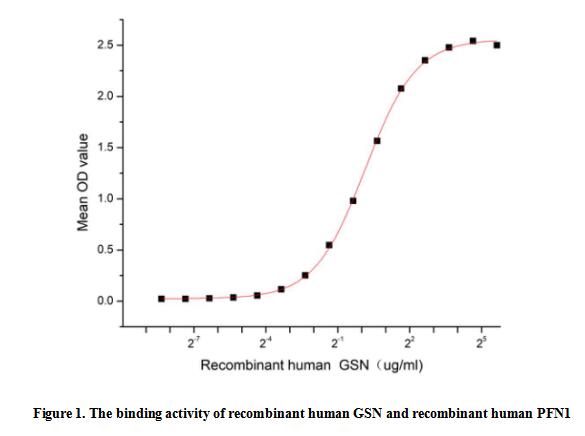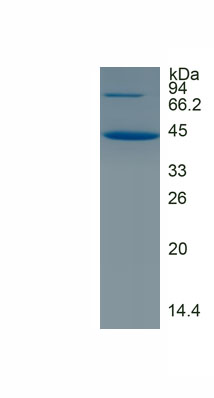Active Gelsolin (GSN) 

GS; AGEL; ADF; Brevin; Gelsolin Amyloidosis,Finnish Type; Actin-depolymerizing factor
Overview
Properties
- Product No.APA372Hu61
- Organism SpeciesHomo sapiens (Human) Same name, Different species.
- ApplicationsCell culture; Activity Assays.
Research use only - DownloadInstruction Manual
- CategoryTumor immunityInfection immunity
- Buffer FormulationPBS, pH7.4, containing 5% Trehalose.
- Traits Freeze-dried powder, Purity > 90%
- Isoelectric Point5.9
Sign into your account
Share a new citation as an author
Upload your experimental result
Review

Contact us
Please fill in the blank.
Activity test

Gelsolin (GSN), one of the most abundant actin-binding proteins, is a multifunctional regulator of physiological and pathological cellular process and regulate cell migration, cell morphology, proliferation and apoptosis. Widely expressed, Gelsolin binds to actin and fibronectin, and is found both secreted in plasma and in cytoplasm and a previous study revealed that the levels of GSN are decreased in various cancer. Profilin-1 (PFN1) can also bind to actin and affects the structure of the cytoskeleton. PFN1 is one of the ligands of GSN, thus a functional binding ELISA assay was conducted to detect the interaction of recombinant human GSN and recombinant human PFN1. Briefly, GSN was diluted serially in PBS with 0.01% BSA (pH 7.4). Duplicate samples of 100 μl were then transferred to PFN1-coated microtiter wells and incubated for 1h at 37℃. Wells were washed with PBST and incubated for 1h with anti-GSN pAb, then aspirated and washed 3 times. After incubation with HRP labelled secondary antibody for 1h at 37℃, wells were aspirated and washed 5 times. With the addition of substrate solution, wells were incubated 15-25 minutes at 37℃. Finally, add 50 µL stop solution to the wells and read at 450/630 nm immediately. The binding activity of recombinant human GSN and recombinant human PFN1 was shown in Figure 1, the EC50 for this effect is 1.11 ug/mL.
Usage
Reconstitute in 10mM PBS (pH7.4) to a concentration of 0.1-1.0 mg/mL. Do not vortex.
Storage
Avoid repeated freeze/thaw cycles. Store at 2-8°C for one month. Aliquot and store at -80°C for 12 months.
Stability
The thermal stability is described by the loss rate. The loss rate was determined by accelerated thermal degradation test, that is, incubate the protein at 37°C for 48h, and no obvious degradation and precipitation were observed. The loss rate is less than 5% within the expiration date under appropriate storage condition.
Increment services
-
 BCA Protein Quantification Kit
BCA Protein Quantification Kit
-
 Molecular Mass Marker for Protein
Molecular Mass Marker for Protein
-
 Monoclonal Antibody Customized Service
Monoclonal Antibody Customized Service
-
 Polyclonal Antibody Customized Service
Polyclonal Antibody Customized Service
-
 Protein Activity Test Experiment Service
Protein Activity Test Experiment Service
-
 Electrophoretic Mobility Shift Assay (EMSA) Experiment Service
Electrophoretic Mobility Shift Assay (EMSA) Experiment Service
-
 Buffer
Buffer
-
 Lentivirus Packaging Experiment Service
Lentivirus Packaging Experiment Service
-
 Adenovirus Packaging Experiment Service
Adenovirus Packaging Experiment Service
-
 Real Time PCR Experimental Service
Real Time PCR Experimental Service
-
 Spike RBD Protein (S-RBD)
Spike RBD Protein (S-RBD)
-
 Protein G
Protein G
-
 Protein A
Protein A
Citations
- Gelsolin in Cerebrospinal Fluid as a Potential Biomarker of EpilepsySpringerLink: 3585r8h46q7r0171
- Treatment with gelsolin reduces brain inflammation and apoptotic signaling in mice following thermal injuryBioMed: 17422094
- Application of iTRAQ quantitative proteomics in identification of serum biomarkers in breast cancerIEEE: 6098563
- Investigation of the actin scavenging system in pre-eclampsiaPubmed: 24239294
- Proteomic Study Reveals Plasma Protein Changes in Congenital Heart DiseasesPubmed: 24565402
- The role of plasma gelsolin in cardiopulmonary bypass induced acute lung injury in infants and young children: a pilot studyPubmed:Pmc4132929
- Gelsolin: Role of a Functional Protein in Mitigating Radiation InjuryPubmed:25164111
- Plasma gelsolin and matrix metalloproteinase 3 as potential biomarkers for Alzheimer diseasePubMed: 25864780
- Comparative mass spectrometric and immunoassay‐based proteome analysis in serum of Duchenne muscular dystrophy patientsPubmed:26680509
- Comparative mass spectrometric and immunoassay-based proteome analysis in serum ofDuchenne muscular dystrophy patients.pubmed:26680509
- Serum gelsolin levels in aneurismal subarachnoid hemorrhage: Preliminary results.pubmed:28365030
- Urine-Based Biomarkers for Alzheimer's Disease Identified Through Coupling Computational and Experimental MethodsPubmed:30040720
- Plasma gelsolin level predicts acute kidney injury after cardiopulmonary bypass in infants and young childrenPubmed:29427164
- Production and Secretion of Gelsolin by Both Human Macrophage-and Fibroblast-like Synoviocytes and GSN Modulation in the Synovial Fluid of Patients with Various …Pubmed:35327525







